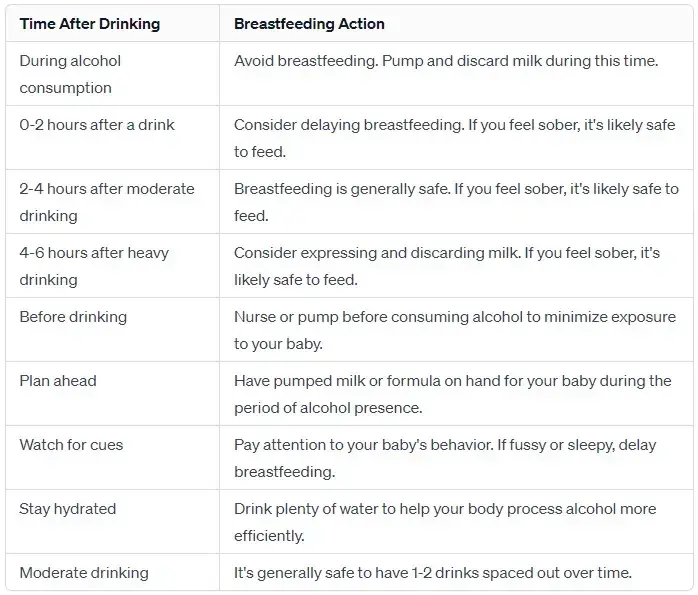Avoiding alcohol is the safest choice for breastfeeding moms. If you choose to drink, keeping it to a moderate amount (up to 1 drink per day) is generally considered okay for the baby. Welcome to our guide on 'Alcohol and Breastfeeding' For the well-being of both mothers and babies, it's important to understand that drinking alcohol while breastfeeding can impact your little one. In this blog, we'll explore why it's generally advisable to avoid alcohol during this period, providing insights and tips to ensure a safe and healthy nursing experience for both you and your baby. Let’s deep dive to learn everything about "Can you drink alcohol while breastfeeding?" you need to know!
Can you drink alcohol while breastfeeding?

Drinking alcohol is a choice that affects not only you but your newborn baby. You must be aware of the effects that alcohol can have on you and your baby. People generally consume alcohol as a way of letting go and feeling a sense of freedom; New mothers are known to drink alcohol and reduce stress and anxiety related to taking care of a newborn child. However, lactating mothers should not drink alcohol while breastfeeding because the negative side effects it can have on your baby are a lot worse and can ruin your child's development.
Remember, it's best to avoid alcohol and breastfeeding, but if you choose to have a drink, keep it occasional and plan it smartly for the safety of both you and your baby.
Breastfeeding and Drinking Alcohol Chart
Always consult your healthcare provider for personalized advice about breastfeeding and drinking alcohol chart is given below:

Why is drinking alcohol bad while breastfeeding?
Besides impairing your brain and slowing down various systems of your body, alcohol is bad while breastfeeding because:
- Alcohol flavors your breast milk, especially beer; Your baby will refuse to drink your milk.
- Alcohol enters the breast milk; Your baby will subsequently drink the alcohol from your milk which is very harmful to the baby (read below)
- Alcohol reduces milk production; your child will not have enough for its initial development.
- Alcohol impairs the mother's reflex action; You won't be able to give your child the necessary attention.
- Alcohol appears in breast milk only 30 minutes after drinking- alcohol is the most readily absorbed drug and moves instantly from the blood to the milk. Learn about "How alcohol affects the brain?"
Does alcohol stimulate the release of breast milk?
Yes. According to an old wive's tale, drinking alcohol boosts milk production. This is completely false. On the contrary, alcohol reduces Oxytocin and increases the level of Prolactin. Low oxytocin and high prolactin delay and slow down the production of milk. Continuous drinking of alcohol will significantly slow down and lessen milk production in lactating mothers.
What are the risks of drinking alcohol to a lactating mother?
When alcohol is present in the bloodstream of a lactating mother, the following effects are seen:
95% of the alcohol enters the breast milk, while 5% remains in the bloodstream
Reduced production of milk
Slows milk ejection reflex
Engorgement of breasts- breast milk thickens and is not completely released from the breast, which causes pain and heaviness.
Alcohol impairs natural reflexes.
Reduces vision and lowers attention span
Being drunk can put your baby at risk.
What effects does alcohol have on my infant?
When the concentration of alcohol is high in breast milk, the effect it can have on your baby who drinks it is mild to severe.
Signs that your baby drinks milk concentrated with alcohol:
- Increased crying episodes
- Shorter sleep periods
- Wakes up with a start
- Feels tired and sleepy
- Wakes up and looks delusional
- Baby becomes irritable
- Baby is less active and does not engage with surroundings
- Baby loses weight
Effects on the baby:
- Cannot metabolize alcohol due to underdeveloped liver
- Growth retardation
- Impaired immune system
- Increased REM sleep
- Delayed motor development
- Impaired cognitive development
- The child will have impaired reasoning skills
- Less total active REM sleep
Decreased milk intake:
- Milk intake by the infant reduces by 25%
- The mother may feel that their baby is getting enough milk, but the baby doesn't
- Less milk intake means the baby does not get enough nourishment
- The baby drinks a lot more milk in the following hours to compensate for the lack of milk content.
When it comes to alcohol and breastfeeding, being mindful is crucial; while the occasional drink may be okay, it's important to plan and limit to ensure a healthy nursing experience for both mom and baby.
Can I occasionally drink while breastfeeding?
No. I hope you all might know the answer of this question “can i occasionally drink while breastfeeding”, While it is safe to completely avoid drinking alcohol when breastfeeding, you must consider the following while drinking:
Babies cannot metabolize alcohol until they are 3 months and older.
Breastfeeding your baby before you drink is the safest option.
If you plan to drink, pump and store some breast milk before you do so to minimize your baby's exposure to alcohol.
If your breasts get full of milk while drinking, you can pump and dump milk it since it contains a lot of alcohol.
If you plan to drink more than just a drink, keep an alternative responsible caregiver for your child.
Wait until you're completely sober before you breastfeed next.
Wail a minimum of 3 hours after drinking before breastfeeding.
Be aware the more you drink, the longer it will take to get cleared from your system.
Eat when drinking- it will slow the rate alcohol enters the milk and bloodstream.
Balancing drinking alcohol and breastfeeding requires careful consideration to ensure the well-being of both the mother and the baby.
What are the signs of alcohol in breastfed baby?
Here are the signs of alcohol in breastfed baby:
Altered Sleep Patterns: Disrupted or unusual sleep patterns may indicate exposure to alcohol in breast milk.
Poor Weight Gain: Inconsistent or slow weight gain may be observed in breastfed infants affected by maternal alcohol consumption.
Irritability and Fussiness: Increased fussiness and irritability may be an indication of alcohol-related effects on the baby's nervous system.
Altered Feeding Behavior: Changes in feeding behavior, such as decreased suckling or difficulty latching, could suggest exposure to alcohol through breast milk.
Unusual Smell of Breath or Urine: Detection of an unusual odor in the baby's breath or urine may raise concerns about alcohol intake by the breastfeeding mother.
You can use breast milk alcohol test strips to check the quality of milk and quantity of alcohol in milk for the well-being of yours and your baby.
What to drink to increase breast milk?
Ensuring adequate hydration is key to supporting breast milk production. Here’s a list of what to drink to increase breast milk.
Drink plenty of water throughout the day, aiming for at least 8-10 glasses. You can carry a water bottle to make hydration convenient and accessible.
Consider herbal teas like fenugreek, fennel, and nettle, known for their potential to promote lactation.
Limit caffeinated beverages, as excessive caffeine intake may affect milk supply.
Consume milk and other dairy products, as they are rich in calcium and can support overall nutrition. You can include fruit juices and smoothies for added vitamins and minerals.
Enjoy soups and broths made with nutritious ingredients like vegetables, lean meats, and bone broth.
These liquid-based meals can contribute to both hydration and nutrient intake.
Maintain electrolyte balance with sports drinks or coconut water, especially during hot weather or periods of increased physical activity.
Ensure a well-balanced diet with a variety of foods to support overall health.
If consuming alcohol, do so in moderation, as excessive alcohol can negatively impact milk production.
Time alcohol consumption strategically, such as after nursing or pumping.
What happens if a baby drinks breast milk with alcohol?
If a baby drinks breast milk containing alcohol, it can be harmful to the baby's health and development. Alcohol can pass from the mother's bloodstream into her breast milk, and when the baby consumes it, their tiny body may struggle to metabolize the alcohol properly. This can affect the baby's central nervous system and may lead to drowsiness, poor feeding, and potential developmental issues. It is crucial for breastfeeding mothers to avoid consuming alcohol in excess and to wait a safe period after drinking before breastfeeding to ensure that the alcohol has cleared from their system.
How much is one drink?
One standard drink is measured differently in different countries. In India, one standard drink is defined as 10g of pure alcohol, which is equal to:
- a 100ml glass of red wine
- A 30ml shot of whiskey
- A 375ml can of beer
Consuming one standard drink is enough to concentrate the human milk with 95% alcohol only 30 minutes after drinking. You must wait for two hours after one drink before breastfeeding. You must wait longer if you have more than one drink.
Takeaway
Consuming alcohol has many negative side effects on both the mother and the infant. It is safer to wait until your baby ages 8 weeks before you resume drinking alcohol. However, in a social environment, if you must drink, then consider every precaution before you put your baby at risk. There is no shame in drinking, so long as you breastfeed safely after drinking. I hope now you understand about "Can you drink alcohol while breastfeeding?"
Popular searches:
Kill tooth pain nerve in 3 seconds permanently | how to get unbloated in 5 minutes | how i cured my eustachian tube dysfunction | how to make yourself sick | ligma disease | how to maintain erection for 30 minutes | heart stent surgery | how i cured my lichen sclerosus | Probiotic foods | What are the benefits of Fenugreek | ketamine infusion | social anxiety test | When Am I Ovulating | Benefits of Dermaplaning | Allergic asthma | keytruda side effects| foods that cause acid reflux | supplements to lower blood pressure| multiple sclerosis symptoms | Ankle Strain vs Sprain
Frequently Asked Questions
How much alcohol actually gets in breast milk?
Less than 2% of alcohol reaches the breast milk but still it is harmful for the baby.
Can breastfeeding mothers drink alcohol?
No, breastfeeding mothers should not drink alcohol.
Can you drink alcohol while breastfeeding?
It's generally advised to limit alcohol intake while breastfeeding.
Is it safe to drink alcohol while breastfeeding?
Moderate alcohol consumption is considered generally safe, but it's crucial to plan and time drinks around breastfeeding.
When can you drink alcohol after giving birth, not breastfeeding?
You can drink alcohol 3-4 hrs after giving birth and not breastfeeding, but it is highly recommended to avoid alcohol consumption.
What happens if you drink alcohol while breastfeeding?
Alcohol can pass into breast milk and can be extremely harmful for the mother and the baby.
While breastfeeding can I drink alcohol?
You should avoid drinking alcohol while breastfeeding.
How long do you have to wait to breastfeed after drinking alcohol?
Waiting for at least 2–3 hours after each standard drink before breastfeeding is advisable to minimize alcohol exposure to the baby.
How much milk should you drink a day to reduce the essence of alcohol?
To minimize the impact of alcohol on breast milk, it's advisable to drink at least one glass of water or other hydrating beverages for each alcoholic drink consumed.
How long does alcohol stay in breastmilk?
Alcohol stays in breast milk at least 60 minutes after consumption of alcoholic beverages.
Is alcohol toxic for babies?
Babies metabolize alcohol at half the rate that adults do. Alcohol can severely damage the growth and development of the child as they grow.
Can you breastfeed after one glass of wine?
Yes, you can typically breastfeed after consuming one glass of wine, especially if you wait 2-3 hours or until you feel sober.

Reviewed by







